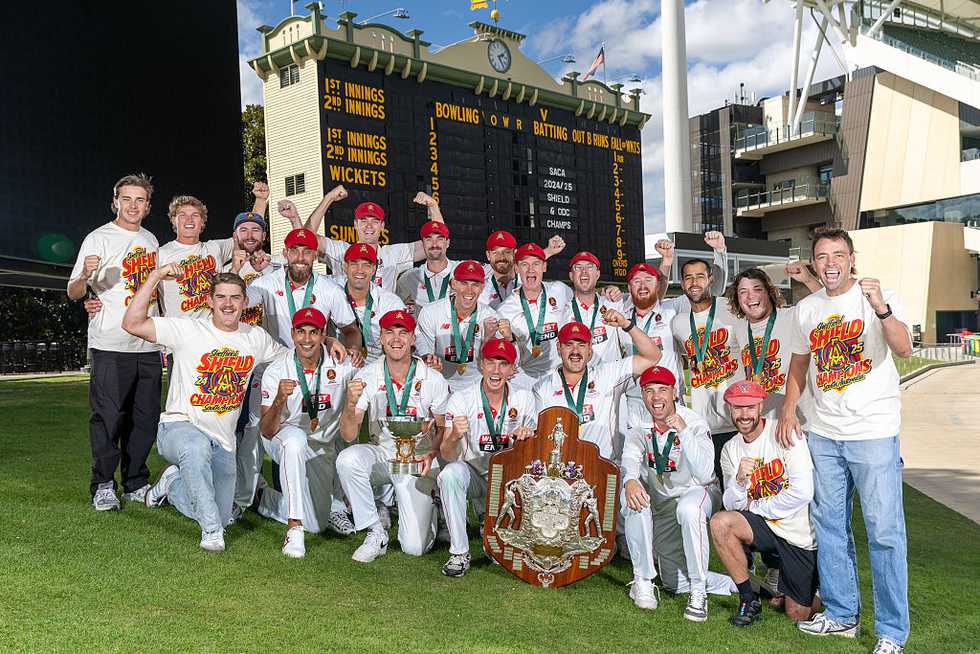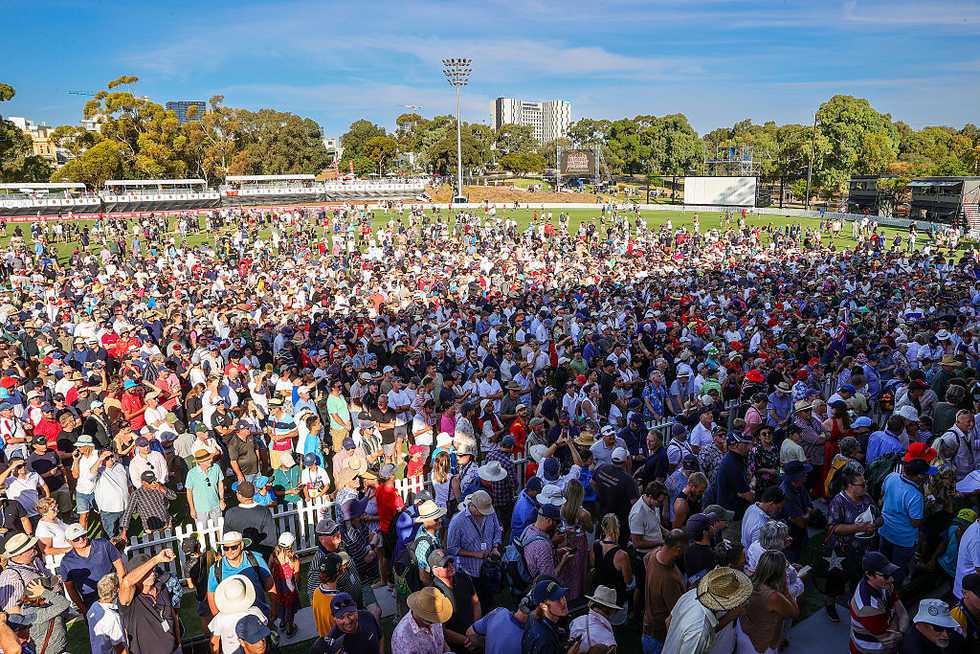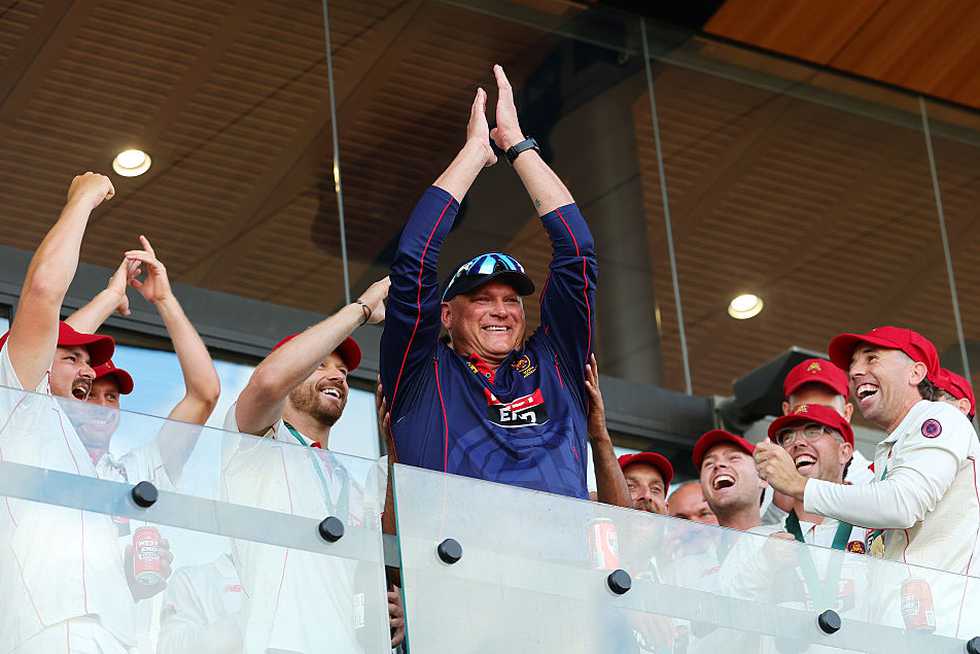
29 years in the making: The anatomy of South Australia's era-defining triumph

For nearly 29 years - exactly five days short - it remained the ultimate 'you had to be there' moment in South Australian history. That's 10,588 days, for the record.
Those who were there at the Adelaide Oval on April 3, 1996, have reminisced about the scenes they witnessed and were a part of ever since. While those who weren't there or those who came after having had to hear about it and imagine those scenes ever since.
So, when the South Australian team finally managed to get their hands on the Sheffield Shield again last weekend, the people of South Australia decided to take matters into their own hands and recreate those scenes from nearly three decades ago. Quite literally.
At 4.50 pm on Saturday (March 29, 2025), Nathan McSweeney and his team had stormed their way to a famous Sheffield Shield final win. The drought had ended. The wait was over.
By 4.51 pm, around 7500 South Australian fans had stormed their way on to the Karen Rolton Oval. It was chaos. It was mayhem. Jason Sangha and Ben Manenti had barely even got halfway to the pavilion before they were mobbed, and had beers poured over them. Not like they minded any of it. Not like they'd even have felt any of it. Sangha, after all, couldn't even recognise his friends and family who'd joined in with the mob as he ran off.
The rest of their teammates couldn't leave their dressing-room to rescue the two heroes in the middle. To start with, they were drenched in as much a state of unbridled ecstasy as everyone else and celebrating the moment themselves. Even otherwise, there simply wasn't any room for it. The Karen Rolton Oval had been taken over entirely, just like the Adelaide Oval had been when Shane George and Peter McIntyre ran off the ground as Sheffield Shield champions, the last time their state team had reached the pinnacle of domestic cricket in Australia.
It was the kind of crowd invasion not seen at a cricket ground in Adelaide, or probably anywhere in the world, this century. It was like the South Australians had decided to rewind the clock and celebrate like it was 1996 all over again.
The eventual invasion has of course by now gone viral all over the world, but there had been signs that it was coming. And even before they jumped over the rather tiny fences around Karen Rolton Oval, the South Australian diehards and the faithful had started banging on them, very much like their predecessors had all those years back.
In 1996, the fence-percussion had commenced with their team needing to survive one more ball to win the Shield for a 13th time. Here, it was set off with the artists formerly known as the Redbacks needing one more run to make it No 14.
The time it took the crowd to storm the oval from the moment the final act was played out in the middle was almost the same 29 years apart. And Sangha raised his arms aloft the moment he pushed the full delivery from Callum Vidler towards the on-side just like McIntyre had after keeping out a full delivery from Brendon Julian.
Multiple generations of South Australians had grown up well into their early 30s without knowing the feeling of belonging to a state that had won the Sheffield Shield. Not anymore. If anything, they'd managed to experience it in exactly the same fashion as those at the Adelaide Oval the last time around. With a few differences of course. They weren't running out holding their mobile phones and trying to capture footage of their mass encroachment of the playing area back then. Nor did they hang around under the dressing-rooms holding their phones up like it was a form of a virtual salute to the players while the final presentations took place on the balcony.
Most of all the match scenario itself couldn't have been more different. The hosts had gone into what was inevitably set to be the final day needing 270 runs for victory, the highest ever in Shield history if they were to get there. Unlike the last South Australian outfit to win it, who had largely played catch-up with Western Australia throughout their final, McSweeney & Co had dominated proceedings for large parts of this contest against Queensland.
They'd bowled the visitors out for 95 within a session-and-a-half on the opening day and taken a significant 176-run first innings lead thereafter. And when Michael Neser was dismissed on the cusp of the lunch break on Day 3, it looked for all purposes like the match wouldn't even get to the weekend. It was only some incredible late-order hitting from Jack Wildermuth on the back of Jack Clayton's patient century that had dragged the match into Saturday, ensuring that the fans here didn't have to leave work early or skip it entirely to be there for the finish. Just on that, there were however a handful of kids on Friday who'd skipped school, with their excuses ranging from dental appointments to 'my mom called in sick on my behalf', to try and be part of history.

It wasn't to be so for the 15-year-olds but the weekend crowd was surely not going to miss out on not just witnessing history but becoming a part of it. There were already around 2500 people around the Karen Rolton Oval with the members' enclosures teeming with patrons even before the run-chase had begun. That number nearly doubled by the end of the second session as Sangha and Alex Carey resurrected the innings from 28 for 3 and began the final thrust towards the target.
As the home team resumed their innings post the tea-break, the official attendance had grown to beyond 5000. It's at this point that the proverbial floodgates were thrown open as South Aussies from all over began streaming into the suburban ground turned big-match venue, with even some of the odd spaces in between the temporary stands now filled with bodies. Shoulder to shoulder, arm in arm, hands together, as the Sangha-Carey stand continued to flourish. They roared as one as the 25-year-old right-hander reached his ton, officially crowning him as their adopted son. It was even louder as their favourite son, Carey, brought up yet another three-figure score for the summer.
As the target got even closer, it almost felt like for every 10 runs, 100 more people were walking through the entrances and thronging the grassbanks. Soon, there was standing room only. Not that anyone was interested or keen on sitting anymore.
And they stayed on their feet till the very end, including when they scrambled over the fences and on to the outfield.
***
If you think the reactions from the crowd at Karen Rolton Oval were simply a case of spontaneous combustion in terms of excitement for a few thousand parochial fans who had witnessed an iconic result, then think again.
This was more than a famous win for the team. It was a win for South Australian sport. It was a win for South Australia. No longer would they have to live with the stigma of having to deal with "will your team ever win a Sheffield Shield again?".
And as the Premier, Peter Malinauskus, announced to the big crowd gathered around the podium in the middle of Rundle Mall on Monday, the Shield win was reflective of a state that "always punches above its weight". He'd even cite statistics to accentuate his point, mentioning how South Australia only made up seven per cent of the country's total population.
It was part of the official reception that the Premier had organised, along with the Lord Mayor of Adelaide, for the victorious Sheffield Shield players and coaches. The fact that nearly a thousand people turned up at midday on the first working day of the week was another sign of how much this win mattered to even those who wouldn't consider themselves as hardcore cricket fans. Not to forget that this was bang in the middle of the busiest commercial hub of the city.
To their credit, the players seemed to be in pretty good stead despite the robust celebrations, as reported, over the previous 40-odd hours. Some weary eyes, probably some sore heads or as coach Ryan Harris described them a few "tired boys". As is customary with him, Carey played down the extent of the post-Shield euphoria saying there was nothing to report and insisting the boys had been pretty good overall.
And even if a couple of them did sound understandably croaky, they seemed pretty high on life while being presented to the crowd one at a time, all decked in their brand-new cream-coloured "Sheffield Shield and One-Day Cup champions" t-shirts and a Shield medal around their necks. The loudest cheers during the introductions were reserved for Carey and coach Ryan Harris. Though the most boisterous response was for Sangha talking about his new-found love for the city of Adelaide, and the presenter Ben Hook bringing up the four victories across formats for South Australia against their nemesis, Victoria.
Some in the audience, meanwhile, looked a lot worse for wear than what the players were expected to be in, with Saturday's win having been celebrated far and wide across the state.
Like at the Karen Rolton Oval, the number of people in front of the make-shift podium in Rundle Mall also grew rapidly and substantially as the reception wore on, with even the lunch-time crowd abandoning their breaks to show the state's new sporting stars their appreciation. They were rewarded though with Carey and the rest of the team staying back to sign posters and pose for selfies. People's team. People's champions.
***

When Ryan Harris took over the role of head coach, replacing Jason Gillespie, last August, he realised it was best to start by addressing the elephant in the room. That being the agonisingly long run without a Sheffield Shield crown. Rather than express his own opinions as to the possible reasons for the rut, he threw the door open for the players to come up with their rationale.
In fact, he'd started the process a year earlier when he was assistant coach under Gillespie. It was on an off-season trip to Darwin, where he sat some of the senior players down over a beer and dinner and asked them for feedback.
The takeaways from the chat for Harris were more clarity in communication from the coaching staff, whether it was about selection matters or even with regards to performance ratings. Along with more structured plans around training and also ideating around how to deal with some longstanding issues the team had faced, from constant batting collapses to not being able to win sessions early in matches.
Harris turned to the team's experienced batting coach Steve Stubbings to tackle the batting group concerns, giving him a free rein. That meant intense nets sessions where batters had to contend with odd distracting noises while they were facing the bowlers, from farting sounds to clashing music genres. If you are into progressive rock, how about you stay focused with bat in hand while having to listen to slow classical music, being one example of his unique methods.
Whatever it was, they worked, with South Australia becoming the most consistent batting team in the competition, leading to unprecedented success both individually and as a team. It took the load off their otherwise high-performing bowling group, led by the ever-reliant Nathan McAndrew.
The frequency of collapses reduced dramatically, and even if they did suffer the odd slip, the middle to lower order would bail them out, like they did once again in the final, across both innings. The batting successes were also spread right through the order. If Henry Hunt at the top was the one putting up the big scores at the start of the season, by the end, the mantle had been taken up by Sangha and even more impressively by Jake Lehmann, who finished up as his team's highest run-getter for the reason which also included three back-to-back centuries, including one in the final to set the game up for South Australia.
The other mantra that Harris brought into the group was to do with 'staying in the fight'. He'd even put up the message, "We Fight" in bold letters on the white board before every team meeting. It was symptomatic of Harris the cricketer, a forever team man who'd give his all for every team he was a part of.
In his own words, he also makes up for his "lack of humour" with endless passion and emotion, both of which came through a lot in the winning moments on Saturday evening and a bit later on the balcony while addressing the massive crowd assembled under the balcony.
Harris had also gleaned from his honest chats with the players that they didn't feel like they spoke enough about winning and rather simply expected to turn the corner. He'd always known that it was a big task on his hands to turn the fortunes around of a team that only three seasons ago was desperate for its first win in two years. Not that he expected for it to transpire so quickly.
But even if bringing an end to the seemingly never-ending run without a Shield title was upmost on his agenda, Harris believes his responsibility is to create a legacy with this South Australian team around winning multiple titles. Particularly, when he looks at the talent on offer in this current lot, which includes a lot of upcoming homegrown talent and smart recruits, including the likes of McSweeney, Doggett and Sangha. And not have to wait another 29 years to bring more cricketing glory to the state.
***
On a cold wintry morning in 2019, there was a preseason session for the South Australians on the parklands in the centre of the city. It mainly involved 2K time trials and other fitness routines preceding a game of soccer. All around them were joggers and other health-conscious sorts going about their business. Not many even batted an eyelid or glanced in the direction of these state representative first-class cricketers with one of them even wondering out aloud if they were the Redlegs (a local Aussie Rules football club based out of the eastern suburb of Norwood).
It was an eye-opener for a new migrant about the popularity, or lack thereof especially beyond the serious and staunch cricket fanbase, of the South Australian cricket team, at a time they were in a state of transition and often finished at the bottom of the Shield table,
It's safe to say they're not only the most sought-after sporting team currently in Adelaide, but they are also on everyone's minds and on their lips, cricket fan or not. Despite this being peak football season, and despite summer having ended well over a month ago. And why not.
They've after all not just allowed South Australia to enjoy a long-awaited tryst with Sheffield Shield glory, 29 years later, they've also more importantly let the people of South Australia create and recreate memories all at once. Even if it meant them breaking the law.
| Share | Tweet |